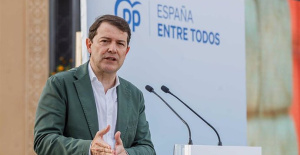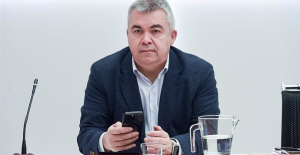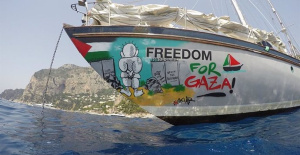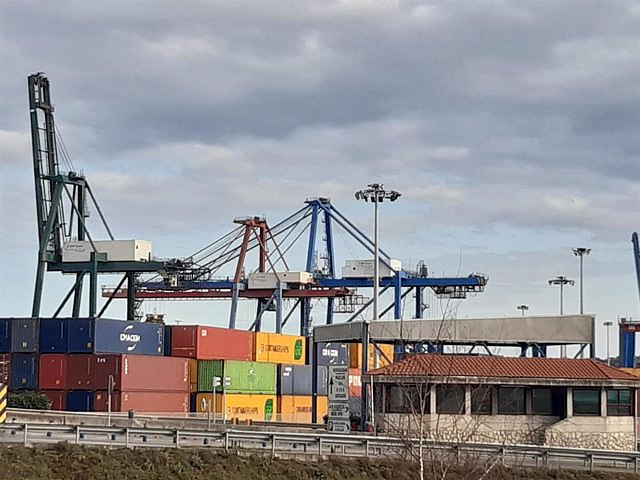One year after the suspension of the Friendship Treaty by Algiers, the crisis remains open while there is a new relationship with Rabat
MADRID, 7 Jun. (EUROPA PRESS) -
One year after the suspension by Algeria of its Treaty of Friendship with Spain in response to the new position adopted by the Government regarding the Sahara, exports to the North African country have been reduced to a minimum, while it remains unchanged the supply of Algerian gas, according to the latest official data consulted by Europa Press.
The other side of the coin is Morocco, a country with which the recognition of the autonomy plan for the Sahara as "the most solid, credible and realistic basis" for a solution laid the foundations for a new bilateral relationship that has resulted in a considerable increase in trade, with the balance tipping on the Spanish side.
According to data from the Ministry of Industry, Trade and Tourism, exports to Algeria fell by 45.9% in 2022 compared to 2021, going from 1,888 million euros to 1,021 million. The trend has continued at the start of 2023 and until the month of March, the last with data, only exports worth 30.2 million euros had been made, compared to 472.9 million in the same period in 2022, which which represents a drop of 93.6%.
The impact is homogeneous in all sectors, from food to energy products, raw materials or chemical products, with declines of over 90% in sales to Algeria. The blow has been somewhat more mitigated in durable consumer goods --59.4% less-- and in consumer manufactures --68.4% less--.
The data shows that although the Algerian government said that it had ordered that the instruction given by the Professional Association of Banks and Financial Institutions (Abef) to block banking operations with Spain be reversed, which prevented exports, coinciding with the suspension of the treaty, in practice trade remains paralyzed.
As soon as Algiers announced that it was suspending the Treaty of Friendship, the Government went to Brussels, since the powers in commercial matters have been transferred and the European Commission expressed its support for Spain.
In the year that has elapsed since then, the Government has religiously conveyed to Brussels the problems that Spanish businessmen have been encountering in their commercial transactions with Algeria, although for the moment the Community Executive has not taken any concrete action.
Community sources consulted by Europa Press have expressed their confidence that through dialogue "concrete results" can be reached and "a solution can be found as soon as possible to restore trade and investment relations without obstacles", "in the name of our strong and long alliance".
The European Commission maintains its coordination with the Spanish Government in this matter and will continue to evaluate "the implications of the Algerian restrictions, apparently incompatible with the Association Agreement" between the bloc and this country. "The EU is ready to rise up against any type of measure applied against a Member State", they have warned.
At the diplomatic level, the Government has insisted at all times that it has an "outstretched hand" to Algeria and the Foreign Minister, José Manuel Albares, has tirelessly repeated that Spain wants the same relations with this country as with the rest of its neighbors, including Morocco, although it has hidden behind the need for discretion regarding the management of this crisis.
However, diplomatic sources consulted by Europa Press insist that it has not been a crisis sought by the Government and argue that a third country cannot interfere in sovereign decisions such as support for the Moroccan autonomy plan for the Sahara, triggering the withdrawal of the Algerian ambassador from Madrid first and the suspension of the Treaty of Friendship three months later.
In this sense, they state that Algeria has not undertaken similar measures, for example, with the United States, a country that paved the way by recognizing the Sahara as Moroccan in December 2020, nor has it adopted any type of retaliation against the countries that have opened consulates in the former Spanish colony, mostly African and Latin American, but among which is also the United Arab Emirates.
For its part, Algeria seems to have opted for indifference in relation to Spain in recent months, with no new crossovers of statements. Its president, Abdelmayid Tebune, promised from the beginning that the gas supply is guaranteed, something that the Spanish government has always recognized, and he also made it clear that his problem is with the Executive and not with Spain.
The Algerian position in recent months shows that in Algiers they are waiting for what the elections bring. Initially, the calculation was to hold out until December, with the expectation of a new PP government that would reverse the "false step", in the words of Tebune de Sánchez, regarding the Sahara, but the electoral advance would now play in their favor.
Meanwhile, the new stage with Morocco inaugurated with the visit of Sánchez and his meeting with Mohamed VI on April 7, 2022 and ratified with the High Level Meeting (RAN) on February 1 and 2, has brought with it a considerable drop in the arrivals of irregular immigrants - something that Brussels has highlighted this week - and a strong increase in commercial exchanges.
The official data consulted by Europa Press confirm it. Thus, in the first three months of the year, exports have increased by 18.6% -3,250.8 million compared to 2,740.4 million--, in line with the 23.8% increase that occurred during 2022 in comparison with 2021.
Last year, 11,748.2 million euros of exports were reached, with a particularly notable increase in the case of the coal and electricity section, where the increase is 254.9% this year and was 874.1% in 2022. .
Imports from Morocco have also increased, although to a lesser extent, according to data from the Ministry of Industry and Commerce. In 2022 there was an increase of 18.9%, after reaching 8,692.3 million compared to 7,309.8 in 2021, and in the first quarter the increase was 8.2%, with purchases worth 2,395.4 millions.
These imports are not taking place at the moment through Ceuta and Melilla. The joint declaration of April 2022 stipulated the reopening of the customs office in Melilla, which Morocco closed unilaterally in the summer of 2018, and the creation of a new one in Ceuta, where to date it had not existed.
Although the two governments have agreed on a schedule for its "gradual and orderly" opening, they have chosen not to make it public on the grounds that they want to avoid "scenes from the past", in reference to the traditional porters.
To date, the agreement has resulted in three goods transit operations on January 27, February 24 and May 26. In all three cases it has been about the passage of a small amount of products to the neighboring country and only in the last one has Moroccan products entered the autonomous cities for the first time.
Despite the small scale of the operations, the Government highlights the "milestone" represented by the opening of a customs office in Ceuta and argues that with this, apart from possible statements by Moroccan leaders, Rabat is recognizing the Spanishness of both autonomous cities, since they only have customs with other countries.

 Exploring Cardano: Inner Workings and Advantages of this Cryptocurrency
Exploring Cardano: Inner Workings and Advantages of this Cryptocurrency Seville.- Economy.- Innova.- STSA inaugurates its new painting and sealing hangar in San Pablo, for 18 million
Seville.- Economy.- Innova.- STSA inaugurates its new painting and sealing hangar in San Pablo, for 18 million Innova.- More than 300 volunteers join the Andalucía Compromiso Digital network in one month to facilitate access to ICT
Innova.- More than 300 volunteers join the Andalucía Compromiso Digital network in one month to facilitate access to ICT Innova.-AMP.- Ayesa acquires 51% of Sadiel, which will create new technological engineering products and expand markets
Innova.-AMP.- Ayesa acquires 51% of Sadiel, which will create new technological engineering products and expand markets Mañueco emphasizes that Spain does not want "a president in hiding" and "surrounded by justice"
Mañueco emphasizes that Spain does not want "a president in hiding" and "surrounded by justice" The 'number three' of the PSOE, Santos Cerdán, will appear this week in the Senate commission of the Koldo case
The 'number three' of the PSOE, Santos Cerdán, will appear this week in the Senate commission of the Koldo case The 'Freedom Flotilla' denounces Israel's "sabotage" of its mission and asks for support and dissemination
The 'Freedom Flotilla' denounces Israel's "sabotage" of its mission and asks for support and dissemination 12M.- Díaz: "I ask Mr. Feijóo to stop laminating the politics of our country"
12M.- Díaz: "I ask Mr. Feijóo to stop laminating the politics of our country" How Blockchain in being used to shape the future
How Blockchain in being used to shape the future Not just BTC and ETH: Here Are Some More Interesting Coins Worth Focusing on
Not just BTC and ETH: Here Are Some More Interesting Coins Worth Focusing on UPV students build a prototype of a wooden house to move to Equatorial Guinea
UPV students build a prototype of a wooden house to move to Equatorial Guinea The UA opens the call for the Impulso 2024 Awards for the best innovative business initiatives
The UA opens the call for the Impulso 2024 Awards for the best innovative business initiatives ALI, virtual assistant from Alicante, internationally recognized by the OECD
ALI, virtual assistant from Alicante, internationally recognized by the OECD Retrópolis brings the golden age of video games and computing to the UPV
Retrópolis brings the golden age of video games and computing to the UPV A million people demonstrate in France against Macron's pension reform
A million people demonstrate in France against Macron's pension reform Russia launches several missiles against "critical infrastructure" in the city of Zaporizhia
Russia launches several missiles against "critical infrastructure" in the city of Zaporizhia A "procession" remembers the dead of the Calabria shipwreck as bodies continue to wash up on the shore
A "procession" remembers the dead of the Calabria shipwreck as bodies continue to wash up on the shore Prison sentences handed down for three prominent Hong Kong pro-democracy activists
Prison sentences handed down for three prominent Hong Kong pro-democracy activists ETH continues to leave trading platforms, Ethereum balance on exchanges lowest in 3 years
ETH continues to leave trading platforms, Ethereum balance on exchanges lowest in 3 years Investors invest $450 million in Consensys, Ethereum incubator now valued at $7 billion
Investors invest $450 million in Consensys, Ethereum incubator now valued at $7 billion Alchemy Integrates Ethereum L2 Product Starknet to Enhance Web3 Scalability at a Price 100x Lower Than L1 Fees
Alchemy Integrates Ethereum L2 Product Starknet to Enhance Web3 Scalability at a Price 100x Lower Than L1 Fees Mining Report: Bitcoin's Electricity Consumption Declines by 25% in Q1 2022
Mining Report: Bitcoin's Electricity Consumption Declines by 25% in Q1 2022 Oil-to-Bitcoin Mining Firm Crusoe Energy Systems Raised $505 Million
Oil-to-Bitcoin Mining Firm Crusoe Energy Systems Raised $505 Million Microbt reveals the latest Bitcoin mining rigs -- Machines produce up to 126 TH/s with custom 5nm chip design
Microbt reveals the latest Bitcoin mining rigs -- Machines produce up to 126 TH/s with custom 5nm chip design Bitcoin's Mining Difficulty Hits a Lifetime High, With More Than 90% of BTC Supply Issued
Bitcoin's Mining Difficulty Hits a Lifetime High, With More Than 90% of BTC Supply Issued The Biggest Movers are Near, EOS, and RUNE during Friday's Selloff
The Biggest Movers are Near, EOS, and RUNE during Friday's Selloff Global Markets Spooked by a Hawkish Fed and Covid, Stocks and Crypto Gain After Musk Buys Twitter
Global Markets Spooked by a Hawkish Fed and Covid, Stocks and Crypto Gain After Musk Buys Twitter Bitso to offset carbon emissions from the Trading Platform's ERC20, ETH, and BTC Transactions
Bitso to offset carbon emissions from the Trading Platform's ERC20, ETH, and BTC Transactions Draftkings Announces 2022 College Hoops NFT Selection for March Madness
Draftkings Announces 2022 College Hoops NFT Selection for March Madness























